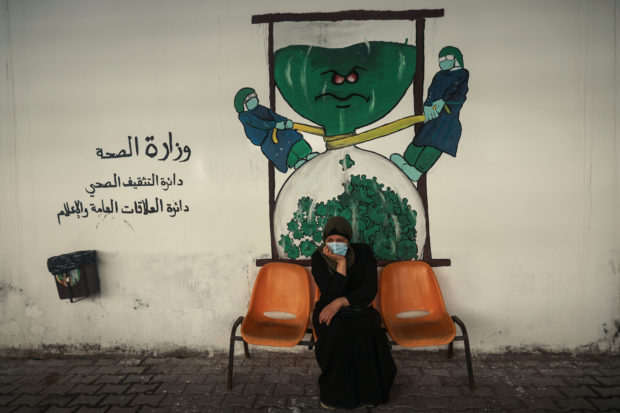COVID-19 denies Gaza cancer patients essential care

Tahani al-Rifi, a 34-year-old Palestinian thyroid cancer patient, sits on a bench in front of a coronavirus-inspired mural in Gaza City on February 1, 2021, amid restrictions imposed during the pandemic which have made traveling for treatment to a hospital in the West Bank impossible for her. Gaza, a Mediterranean enclave controlled by the Hamas Islamist group since 2007, had a weak healthcare system before the coronavirus pandemic, due partly to an Israeli-enforced blockade. Israel tightly controls the flow of goods and people in and out of Gaza, measures it says are necessary to contain Hamas and other jihadist groups in the strip. Mohammed ABED / AFP
GAZA CITY — For Tahani al-Rifi, a 34-year-old Palestinian thyroid cancer patient, her twice-monthly trips out of Gaza for iodine radiotherapy had offered hope that she could beat the illness.
But restrictions imposed during the pandemic have made traveling for treatment to a hospital in the West Bank impossible for her, leaving Rifi with few options as her health has worsened.
“My blood tests show that my condition has deteriorated,” she told AFP, wearing a floral scarf while speaking through a pink protective mask.
“I’m living on sedatives, because of the pain in my feet and neck.”
Gaza, a Mediterranean enclave controlled by the Islamist group Hamas since 2007, had a weak healthcare system before the coronavirus pandemic, due partly to an Israeli-enforced blockade.
Article continues after this advertisementIsrael tightly controls the flow of goods and people in and out of Gaza, measures it says are necessary to contain Hamas and other jihadist groups in the strip.
Article continues after this advertisementBecause radiotherapy is unavailable in Gaza, Rifi had been traveling to Hebron in the occupied West Bank for treatment, a journey that requires transit through Israel.
Since the Covid-19 pandemic was declared last year, crossings into Israel have been restricted further.
For Gaza cancer patients, the Jewish state has allowed gravely ill people to be transferred to the West Bank or east Jerusalem, the majority Palestinian part of the city it annexed following the 1967 Six-Day War.
Rifi said her case was not considered acute enough to qualify for an emergency transfer.
Her last radiotherapy session was in August, and she has felt too weak to exercise at the sports club near home in east of Gaza City, she added.
Access to care
Gaza, which has a population of roughly 2 million, has recorded more than 51,500 coronavirus cases, including more than 520 deaths, according to Hamas’s health ministry.
Poverty rates, which stood at nearly 50 percent before the pandemic, have increased — in part due to economic hardships exacerbated by the lockdowns that Hamas has imposed to stem transmission.
Imane Shanane, who runs a patient advocacy organization in Gaza, said cancer sufferers had been left “more fragile” by the pandemic.
According to her, 7,000 Gazans are currently diagnosed with cancer.
Hamas has said about 100 of them are awaiting permission to cross into Israel.
Cancer patients “deserve more access to medical care,” said Shanane, herself a breast cancer survivor.
Gazans can also receive medical treatment in neighboring Egypt by traveling through the Rafah crossing, but it also has only been open sporadically during the pandemic.
“The fragile health system, the Israeli blockade, the closure of crossings and the shortage of drugs and medical equipment: it is cancer patients who pay the price in Gaza,” Shanane said.
Rim Fathi, an 18-year-old Gazan diagnosed with leukemia, said she had received permission to travel to Jerusalem for treatment because of the severity of her case.
But she voiced fear of leaving home and contracting coronavirus in Israel.
“I would rather suffer here,” she said.
‘We’ll pay what it takes’
Rifi expressed the hope that her transit through the Erez crossing will be approved soon, allowing her to resume treatment.
“But I need 1,800 shekels ($545) to travel and stay in Hebron,” she said, explaining that she intended to borrow the money if her transit is approved.
Typically the Palestinian Authority, based in the West Bank, pays part of the costs for medical travellers.
But to ensure there are no delays in waiting for funding, Rifi’s family said they would pay out of pocket as soon as the trip is approved.
“Her condition is no longer tolerable,” her 70-year-old white-haired father, Radwan, told AFP.
“We will pay what it takes to keep her from dying.”
For more news about the novel coronavirus click here.
What you need to know about Coronavirus.
For more information on COVID-19, call the DOH Hotline: (02) 86517800 local 1149/1150.
The Inquirer Foundation supports our healthcare frontliners and is still accepting cash donations to be deposited at Banco de Oro (BDO) current account #007960018860 or donate through PayMaya using this link.